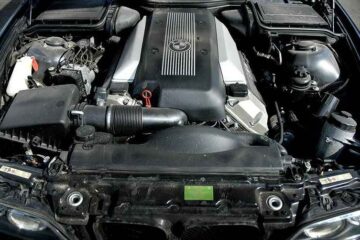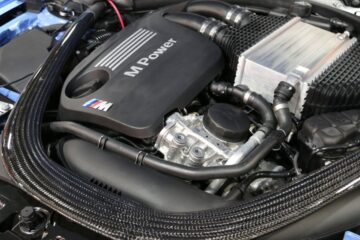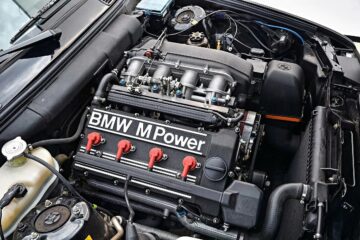The M70B50 engine is a power unit that has twelve cylinders, and has a V configuration. In this case, the cylinders are flared at an angle of 60 degrees. The working volume of the powertrain is 5 liters. The cylinder block of this power unit is made of alusil, and it is covered by an aluminum cylinder head. The motor is capable of producing up to 300 horsepower and its maximum torque is 450 Nm.
The BMW M70B50 powertrain is covered with cylinder heads from the M40B18 engine, which have been slightly modified. The main change is that the number of cylinders on each head has been increased by one and a half times to 6 instead of four. The valves, rockers, valve seals and hydraulic compensators remained the same. The internal casting, as well as the shape of the combustion chamber itself is also the same. The M70B50 motor is actually made of two M40B18 power unit cylinder blocks, which were lengthened by two cylinders, then joined at an angle of 60 degrees. The connection was made on the same crankshaft, the only difference being the material used to make them, which reduced weight. The distance between the cylinders, as well as their diameter, remained unchanged and the same as in the M20 and M50 series.
In the injection system there are two independent Motronic 1.7 ramps, so the M70B50 engine will not be able to run on one ebu, it will be accompanied by a constant eml error on the dashboard. Each cylinder is characterized by an individual electronic throttle valve.
M70B50 engine specifications
| Power, hp. | 299 – 300 |
| Fuel type | Premium gasoline AI-98 |
| Volume, cm*3 | 4988 |
| Maximum torque, N*m (kg*m) at rpm. | 450 (46) / 4100 |
| Fuel consumption, l/100 km | 12.9 – 13.6 |
| Engine type | V-twin, 12-cylinder. |
| Cylinder diameter, mm | 84 |
| Number of valves per cylinder | 2 |
| Maximum power, hp (kW) at rpm. | 299 (220) / 5200; 300 (221) / 5200 |
| Compression ratio | 8.8 |
| Piston stroke, mm | 75 |
Advantages
Maintenance of M70B50 is somewhat different from the usual motors of the German concern, and has additional advantages. Valve adjustment is no longer a mandatory procedure for drivers, as the power units were equipped with hydraulic compensators. Auxiliary drives also do not require constant maintenance due to the use of belts with special special design.
M70B50, the characteristics of which provide for independent operation of each row of cylinders, stands out against the general background of power units. Special problems do not worry motorists, only the mkpp or servo drives of the motors responsible for the functionality of the throttle flap can fail. An important component that affects the suitability of the engine for repair is the easy availability of spare parts. The availability of parts without any restrictions is undoubtedly an advantage, but the high cost of components causes certain problems for owners of such motors.
Disadvantages
Technical characteristics, as well as the reliability of all motors of the German concern, have never been questioned. As a rule, more malfunctions occur precisely because of improper maintenance and lack of proper care. Each power unit is individual, and requires a certain approach. Just like the M73B56, the M70B50 engine can fail its owner due to the use of low-quality fuel. The injectors and high-pressure fuel pump usually cannot withstand the use of low-quality fuel. The use of diesel engines entails the need for constant monitoring of fuel quality.
Refining of the M70B50 engine is not required, despite the fact that a huge number of owners complain of constant valve burnouts. This is caused by improper maintenance. If you change the oil in time, then such troubles do not occur. The oil level also constantly has to be monitored, since the manufacturer allows the consumption of up to 800 milliliters per 1000 kilometers of mileage. Oil seals often have to be replaced. Timely maintenance of the power unit maximally postpones the need for major engine overhaul, which may not be necessary at all.
Filling with quality engine oil has a direct impact on fuel consumption and engine life. This range of engines is very finicky about the lubricants used. This entails a very large list of applied lubricants, which are prescribed in the operating books. But irrespective of the labels used, only synthetic lubricants are used. Such performance engines do not provide for mineral lubricants. The markings of the oils that can be used are as follows:
- 5W-40.
- 10W-40.
The use of lubricants with SN or MB 229.5 approval is optimal. This choice is due to the high operating temperature in the interior of the power unit. The climatic conditions of a particular region can also influence the choice of oil.
Tuning
This range of engines shows excellent performance even without additional modifications. The dynamics of the power units are enviable, as are the technical power characteristics. Tuning of such power units is quite rare. Usually, it is reduced to replacement of the injector. This action allows you to reduce fuel consumption by about 10-15 percent, while the power remains the same. Replacing the guides with bronze products is also a common rework, as standard parts can cause certain problems. Cylinder boring also has a place in the set of procedures for tuning, but it significantly affects the resource of power units.
Otherwise, the changes remain standard – the fuel supply system is refined and new software is installed. The standard control unit is also replaced with a more modern one. This allows for a few extra horsepower. Replacing the fuel injectors is the most effective way to increase power. You can get the most horsepower gain and also save money, as all injectors from BMW sport models are suitable for these powertrains without the need for modifications and design changes.



0 Comments